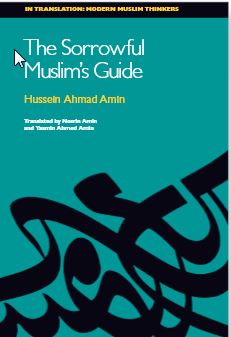- Milano
- Dipartimento di Scienze religiose
- Notizie
- The Sorrowful Muslim's Guide
The Sorrowful Muslim's Guide
È in corso di pubblicazione, in versione inglese, l'opera di Hussein Ahmad Amin, The Sorrowful Muslim’s Guide, translated by Yasmin Amin and Nesrin Amin (In Translation: Modern Muslim Thinkers 3), Edinburgh: Edinburgh University Press, 2018.
Saggio originale: Amīn, Ḥusayn Aḥmad. 1983. دليل المسلم الحزين إلى مقتدى السلوك في القرن العشرين: ودراسات إسلامية أخرى. بيروت: دار الشروق.
In occasione della presentazione del volume, che avrà luogo il 29 novembre presso l'Aga Khan Centre di Londra, Paolo BRANCA, curatore dell'Introduzione, è stato invitato a parlare su Islam modernista e pensatori contemporanei.
Hussein Ahmad Amin (1932-2014), nato in Egitto, dopo la laurea in giurisprudenza presso l'Università del Cairo entra nel corpo diplomatico del Ministero egiziano degli affari esteri. The Sorrowful Muslim’s Guide, scritto mentre prestava servizio come vicedirettore dell'Istituto diplomatico del Cairo, suscitò reazioni estremamente critiche da parte dell'establishment religioso tradizionalista e provocò minacce di morte e accuse di eresia da parte di organizzazioni religiose egiziane di stampo estremista.
Dal catalogo della Aga Khan University di Londra, che ha promosso la traduzione:
«This topical work belongs to the finest tradition of what might be called modern Islamic Humanism and stands comparison with the best works of Egyptian figures like Taha Hussein, Abbas Mahmud al-Aqqad, and Salama Musa.
Amin chooses the form of the essay to address a number of diverse issues of contemporary Islamic culture. The subjects covered range from the need to reinstate ijtihad (independent legal reasoning) to the need for a new and unapologetic biography of Muhammad, to an attempt at Qur’anic exegesis, to a critique of the abuse of Hadith, to certain habits of religious thought inherited from nomadic culture which need to be subjected to radical reinterpretation.
No history of modern Islamic thought, especially rationalist thought, can disregard this work. This is not only because of its purely scholarly importance to the historian of ideas, but also its charm, its gentle persuasiveness, and its succinct description of what the author identifies as the shortcomings of modern Muslim thought, all of which make this work of major importance to any reader, specialist or general, interested in modern Islam. The book received the Best Book Award at the 1983 Cairo International Book Fair.»

